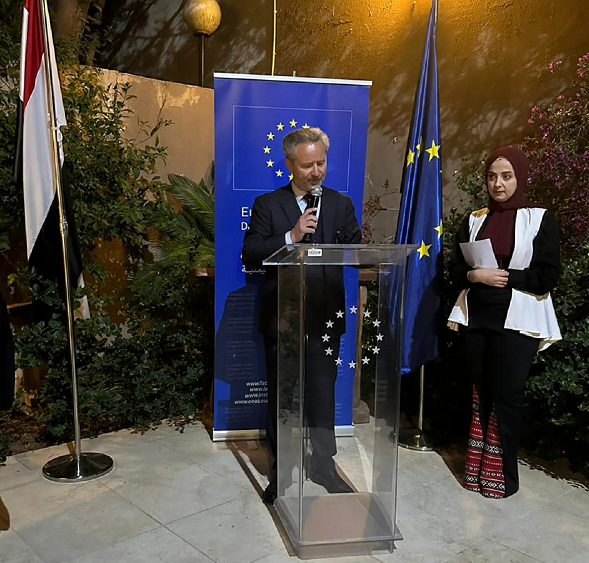Excerpts from speech delivered by Ambassador Gabriel Munuera Viñals to mark Europe Day

Today, 73 years later, our continent is going through a critical period in its history, with the war raging in Ukraine. We have seen how peace and security in Europe can be fragile, and how we must work to preserve, promote, and defend it. The war has already changed Europe, and despite all the horrors, I believe we will come out stronger and more unified.
Despite a war in Europe and increasing economic challenges, the EU has remained active and engaged in Yemen. The outbreak of new conflicts and hotbeds of tension around the world has not diverted the EU's attention from Yemen. And while conflict has increased elsewhere, Yemen has witnessed important positive developments over the course of the last twelve months.
Yemen has entered into an unprecedented hopeful chapter since the outbreak of the conflict. The truce brokered by UN Special Envoy Hans Grundberg ushered in a period of relative calm, the longest such period Yemen has seen in the last 8 years of war.
The truce, although not renewed last October, has nevertheless maintained a state of relative stability with a significant decline in hostilities across the country. Many Yemenis continue benefitting from flights between Sana’a and Amman, and from many more shipments entering Hodeida ports.
Although there is still a long way to go, we are sensing a political will to turn the page of the conflict in Yemen. We have all followed and welcomed the efforts in particular of the Kingdom of Saudi Arabia and the Sultanate of Oman in recent months, and we hope that they will lead to a favourable outcome soon. For the European Union, a comprehensive and inclusive political process is of paramount importance, as we believe that only such a process can lead to a sustainable peace in Yemen.
The EU has been particularly active in three strategic areas that underline the importance of the European Union’s engagement in Yemen.
Firstly, on the political front: We have actively supported the UNSE's efforts to bring about lasting peace in Yemen. We have undertaken together with our Member States no less than five visits to Aden, not to mention the numerous visits of our cooperation and ECHO colleagues to Sana'a and elsewhere in the country.
The regular interactions we have with the Presidential Leadership Council (PLC) culminated in the visit of His Excellency Rashad Al Alimi, President of the PLC, to Brussels this past February. He had the opportunity to meet with European Council President Michel, High Representative Borrell and many other senior EU officials and European interlocutors. These engagements have helped strengthen the partnership and bilateral relationship with the Yemeni authorities.
Secondly, on the humanitarian front: Despite, some improvements and the reduction of hostilities, enormous humanitarian needs remain. It is critical to maintain humanitarian support to ensure gains made are not lost. The EU has always been a reliable partner for Yemen on humanitarian matters. In this respect, during the high-level pledging event held in Geneva in February, the EU was the largest contributor. The EU and its Member States made the biggest pledge, totalling US$ 500 million.
Finally, on the development cooperation front: I am proud to note that we have been particularly active over the last year as one of the largest development donors in Yemen, focusing on building resilience, supporting the economy, and promoting peace, security and human rights. In addition to our good relations with the Yemeni authorities, our engagement with and support to civil society and non-governmental organisations is fundamental – they will be key players in tomorrow's peace.
Our combined action in these three areas all support a common simple objective: lasting peace in Yemen, for all Yemenis.
Obviously, “all Yemenis” includes the half of the population that is currently largely excluded from peace efforts: the Yemeni women. In addition to their limited political participation, I am deeply concerned about the restrictions being placed on women's freedom of movement in parts of the country, particularly in the north. This undermines Yemeni women’s ability to work, gain financial independence, participate in society and contribute to the delivery of essential humanitarian and social services.
To these women, I want to extend my support. Excluding women from politics and society will be detrimental for the prospects of sustainable peace, prosperity and development of Yemen. Yemen is no exception, no country can prosper if half of the population is excluded.
To the young Yemenis who are also largely excluded from decision making about the future of their country and who have been deprived of their childhood and youth because of the war, I want to remind you that you are the Yemen of tomorrow, the lifeblood of the nation.
